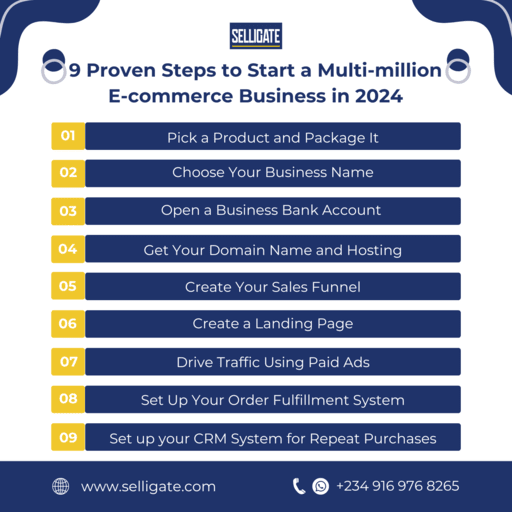
If you want to earn millions in 2024, one of the best options is to start an ecommerce business.
With the right steps and investment, you can earn millions from the comfort of your home, office, or working space. Selligate has helped 100+ ecommerce businesses and merchants scale into seven-figure earnings monthly and now shares nine proven steps, with additional tips on how you can start an ecommerce business in Nigeria and also earn millions.
9 Proven Steps to Start an Ecommerce Business
1. Pick a Product and Package It
The very first step to take before you start an ecommerce business is to identify a high-demand product within your niche or area of interest. Look for products with a healthy profit margin to ensure your business sustainability. If you choose to be a retailer, negotiate good deals and build positive relationships with your suppliers. Alternatively, you can source your products from established platforms like Jumia or Jiji while you pay close attention to factors like pricing, supplier location, and contact details.
Why it’s important: Choosing the right product is vital for success. You’ll be investing time and resources, so ensure there’s a market for what you’re selling. A profitable margin allows you to cover your costs and generate income. How do you calculate your profit?
Formula:
Total Revenue – Total Expenses = Profit
Total Revenue is the total amount of money you generate from sales before any expenses are deducted. While total expenses include all the costs associated with running your e-commerce business. i.e Cost of Goods Sold + Operating Expenses:
Example:
- Total Revenue: ₦10,000
- Cost of Goods Sold (COGS): ₦5,000
- Operating Expenses: ₦2,000 (Website hosting, marketing, packaging)
- Gross Profit: ₦10,000 (Revenue) – ₦5,000 (COGS) = ₦5,000
- Net Profit: ₦5,000 (Gross Profit) – ₦2,000 (Operating Expenses) = ₦3,000
2. Choose Your Business Name and Create Your Online Presence
Pick a memorable business name that reflects your product category. Consider creating a Facebook page with a name that encompasses your product range and related items. (e.g., “Gadgets Galore” instead of “Phone Arena”). This builds brand awareness and allows you to connect with potential customers.
Why it’s important: A strong brand name and online presence are essential for attracting customers and establishing yourself in the market.
3. Open a Business Bank Account
Having a dedicated business bank account is crucial for managing your finances professionally. This separates your personal and business transactions, making record-keeping and tax filing easier. Before you start an ecommerce business, open a business bank account with a trusted banking institution.
Why it’s important: A business bank account establishes legitimacy and simplifies financial management. It’s essential for building trust with customers and potential partners.
4. Get Your Domain Name and Hosting
You will need a website in the short-term or long-term for your e-commerce business. Secure a domain name (your business website address) from a reputable provider like Namecheap. Choose your website hosting plan from a reliable company like Godaddy or WhoGoHost. This gives you the space to build your online store. Additionally, get a professional email address associated with your domain for a polished look. Alternatively, you can create a website on e-commerce platforms such as Shopify.
Why it’s important: Your domain name and hosting are essential for creating your e-commerce website, the core of your online business. A professional email address builds trust and credibility.
5. Create Your Sales Funnel
A sales funnel isn’t a single page, but a multi-step process that guides potential customers towards a purchase. It can involve a series of web pages, emails, or social media interactions. This funnel educates potential customers about your products, builds trust, and ultimately leads them to buy.
Why it’s important: A well-crafted sales funnel nurtures leads and increases your conversion rate (turning visitors into customers). It is important to have it in place before you start an ecommerce business.
6. Create a Landing Page
A landing page is a single, focused web page designed to capture a specific visitor action, like signing up for an email list or making a purchase. Landing pages typically target a specific audience reached through advertising or organic search. They should be clear, persuasive, and include a compelling call to action (CTA). You can use popular landing page builders such as Thrive Architect.
Why it’s important: Landing pages are laser-focused on conversions and help you capture leads or sales from targeted audiences.
7. Drive Traffic Using Paid Ads
Once your website and landing pages are set up, it’s time to market and promote your product. Leverage paid advertising platforms like Facebook Ads to reach your target audience. Carefully craft your ads to showcase your products and special offers.
Why it’s important: Paid advertising allows you to reach a wider audience and drive targeted traffic to your website and landing pages.
8. Set Up Your Order Fulfillment System
Decide on a fulfillment method – will you handle deliveries yourself, or outsource to a courier company? Establish a clear return and exchange policy to build customer trust. Also, in a country like Nigeria, payment-on-delivery works better for online shoppers. All these should be taken into consideration. You can use the Selligate application free for your order fulfillment.
Why it’s important: A well-defined order fulfillment system ensures a positive customer experience, which is crucial for repeat business and positive word-of-mouth marketing.
9. Set up your CRM System for Repeat Purchases
A CRM (Customer Relationship Management) system helps you nurture leads, cultivate strong customer relationships, and encourage repeat purchases, driving long-term growth for your e-commerce business. There are many CRM systems available, both free and paid. Choose one that suits your business size and budget. A complete e-commerce CRM system is included in the Selligate application.
Read also: 6 Steps to Successfully Start an E-commerce Business in Nigeria: Guide for 2024
Additional Tips to Start an Ecommerce Business
- If you’re new, start by targeting your immediate location first.
- Sell with a profit of at least N5,000.
- Sell unique products.
Selligate helps you to successfully execute all aspects of your e-commerce business for free, Start here.
Frequently Asked Questions
1. What is the difference between e-commerce and e-business?
A: E-commerce refers specifically to the buying and selling of physical products online, while e-business encompasses all online commercial activities, including e-commerce, electronic banking, and online marketing.
2. What are the steps to starting an e-commerce business?
There are several steps involved in launching an e-commerce business, including choosing a product to sell, finding a supplier, creating an online store, and establishing marketing strategies.
3. What are some of the best e-commerce business ideas to start?
The best e-commerce business ideas depend on your interests and market research. However, some popular options include selling handmade goods, personalized products, or niche items with limited competition.
4. How can I simplify starting an e-commerce business?
There are many user-friendly platforms available to help you launch your online store. These platforms often offer website-building tools, product management systems, and marketing integrations.
5. What is the e-commerce supply chain?
The e-commerce supply chain involves the entire process of getting a product from the manufacturer or supplier to the customer’s doorstep. This includes order processing, inventory management, warehousing, and fulfillment.
6. Is starting an e-commerce business a good idea in Nigeria?
Yes, the e-commerce market in Nigeria is rapidly growing. With a large and tech-savvy population, there’s a significant opportunity for online businesses.

